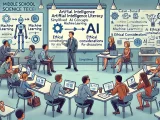
Top 12 AI Tools Revolutionizing Bioinformatics Research in 2025: Must-Have ChatGPT-Like Platforms
July 30, 2025In 2025, bioinformatics is undergoing a transformation, driven by AI-powered tools that leverage large language models (LLMs) to simplify complex tasks like sequence analysis, protein structure prediction, and literature mining. These ChatGPT-like platforms are making advanced bioinformatics accessible to researchers, regardless of computational expertise. This blog post highlights the top 12 online AI tools for bioinformatics, their applications, and how they empower researchers to accelerate discoveries in genomics, proteomics, and drug development. Packed with links and insights, this guide is your go-to resource for navigating the future of bioinformatics.
Why AI Tools Are Game-Changers for Bioinformatics
AI tools, built on advanced LLMs, excel at processing biological data—such as DNA, RNA, and protein sequences—and extracting insights from vast scientific literature. By offering natural language interfaces, code generation, and integration with biomedical databases, these platforms streamline workflows, enhance accuracy, and democratize access to cutting-edge research tools. Whether you’re annotating genes, predicting protein structures, or mining literature, these tools are revolutionizing bioinformatics research.
Top 12 ChatGPT-Like AI Tools for Bioinformatics
Tool Name | Description | Key Features | Link |
|---|---|---|---|
DrBioRight 2.0 | LLM-powered platform for cancer functional proteomics, integrating large-scale omics data. | Natural language interface, proteomics data analysis, biomarker discovery, interactive visualizations. | DrBioRight 2.0 |
BioChatter | Open-source Python framework for integrating LLMs with biomedical research tools. | Text mining, knowledge graph integration, API-driven bioinformatics tasks, customizable for research needs. | BioChatter |
GeneGPT | LLM trained to use NCBI Web APIs for genomics queries, excelling in multi-hop questions. | Accurate genomics data retrieval, sequence alignment, reduces hallucinations via external database access. | GeneGPT GitHub |
IgLM | Specialized LLM for generating synthetic antibodies by modeling immunoglobulin sequences. | Antibody design, therapeutic development, sequence-based predictions. | IgLM GitHub |
ESMFold | Transformer-based protein language model for predicting protein structures from sequences. | Rapid protein structure prediction, metagenomic analysis, drug target identification. | ESMFold |
Chatlize.AI | LLM-based platform for automated bioinformatics workflows and data analysis. | Workflow automation, code generation, error feedback, user-friendly for non-coders. | Chatlize.AI |
RTutor.AI | AI tool for generating and refining bioinformatics code, particularly for statistical analysis. | Code generation, error correction, supports R and Python, educational support for beginners. | RTutor.AI |
Perplexity.AI | AI-powered search engine for contextual literature mining and answering bioinformatics queries. | Contextual search, summarizes research papers, provides citations, integrates with public datasets. | Perplexity.AI |
Consensus.app | Academic search engine fine-tuned for biomedical literature mining. | Extracts and aggregates results from papers, provides citations, identifies relevant studies. | Consensus.app |
SciSpace | AI-driven platform for literature review and querying scientific PDFs. | Literature review, PDF querying, paraphrasing, summarizing research papers. | SciSpace |
Scite.AI | Citation assistant for contextual summaries and literature analysis. | Contextual summaries, citation analysis, identifies supporting/refuting papers, literature mining. | Scite.AI |
Unriddle | AI tool for reading and annotating research papers, aiding literature mining. | Summarizes papers, annotates key points, supports rapid literature review, user-friendly interface. | Unriddle |
How These AI Tools Empower Bioinformatics Research
Sequence Analysis and Genomics
Tools like GeneGPT and ESMFold excel at processing DNA, RNA, and protein sequences. GeneGPT retrieves precise genomics data via NCBI APIs, while ESMFold predicts protein structures with atomic-level accuracy, aiding in metagenomic studies and drug target identification.Proteomics and Drug Discovery
DrBioRight 2.0 and IgLM streamline proteomics and antibody design. DrBioRight integrates large-scale cancer omics data for biomarker discovery, while IgLM automates synthetic antibody generation, accelerating therapeutic development.Literature Mining and Knowledge Extraction
Platforms like Perplexity.AI, Consensus.app, SciSpace, Scite.AI, and Unriddle transform literature reviews by summarizing papers, extracting key findings, and identifying relevant studies. These tools save researchers hours of manual reading and synthesis.Code Generation and Workflow Automation
Chatlize.AI and RTutor.AI generate and debug R and Python code for bioinformatics tasks, making statistical analysis and pipeline development accessible to non-coders.Accessibility for All Researchers
Tools like BioChatter and DrBioRight 2.0 offer natural language interfaces, enabling biologists without coding expertise to perform complex analyses, from knowledge graph queries to proteomics visualizations.
Challenges and Best Practices
While these AI tools are powerful, they come with challenges:
Accuracy and Validation: LLMs may produce “hallucinations” or errors, especially in quantitative tasks like SNP analysis. Always validate outputs with primary data or experimental results.
Data Integration: Tools like BioChatter and GeneGPT rely on external databases, so ensure proper API access and data compatibility.
Computational Resources: Some tools (e.g., ESMFold) require significant computational power, which may limit accessibility for smaller labs.
Best Practices:
Use precise prompts to improve output relevance.
Leverage retrieval-augmented generation (RAG) features in tools like Perplexity.AI and BioChatter for accurate, context-aware responses.
Cross-check AI-generated results with domain expertise and peer-reviewed sources.
Future of AI in Bioinformatics
The future of bioinformatics lies in integrating AI tools with experimental workflows. Expect advancements in:
Improved Accuracy: Enhanced models with better validation to reduce errors.
Scalability: Cloud-based solutions to make tools accessible to smaller research groups.
Ethical AI: Addressing biases in training data to ensure generalizability across diverse datasets.
Conclusion
The 12 AI tools listed above—ranging from DrBioRight 2.0 for proteomics to SciSpace for literature mining—are transforming bioinformatics in 2025. By simplifying sequence analysis, accelerating drug discovery, and streamlining literature reviews, these platforms empower researchers to push the boundaries of life sciences. Explore these tools via their links, integrate them into your workflows, and stay ahead in the rapidly evolving field of bioinformatics.

















